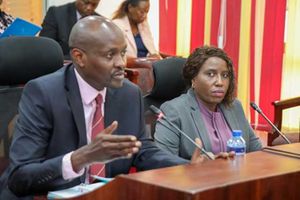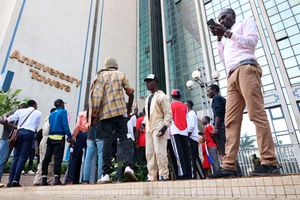
From left: University students Grace Wangare, Simon Khaemba, Sydney Mwangi, Andrew Kituku, Allan Ochieng and Michelle Misera.
Michelle Misera was a pupil at Lukenya Schools for her primary education. Her father worked as a janitor there, so she was awarded a scholarship from Class Five to Class Eight.

Michelle Misera.
She did well in the Kenya Certificate of Primary Education exam and joined Bishop Gatimu Ngandu Girls for her secondary education. Here, too, she was lucky to secure several scholarships. She went on to score impressive grades in the Kenya Certificate of Secondary Education (KCSE) exams and got admission to Jomo Kenyatta University of Agriculture and Technology (JKUAT) last year.
But she is constantly worried that her university education will be disrupted anytime because the new funding model has placed her under a well-to-do family, which means her parents are to pay the biggest part of the fees. All because she attended a high-end primary school.
“It’s easy to judge someone by the name of a school without understanding the story behind it. You try to focus in class, but your mind is always on how to raise money. I do some online writing here and there, but it’s not enough,” Michelle laments.
Being placed in Band 4, which requires higher household contribution, instead of Band 1, has stretched her family to the end. Now going into her second year of study, she’s constantly worried about being sent home due to fees arrears.
Students placed in Band 1 are eligible for the highest government support under the university funding model while those in Band 4 receive minimal or no government aid, forcing them to shoulder nearly the full cost of their education.
“I’m supposed to pay Sh72,000 every semester. That’s over Sh140,000 for the academic year. I’ve only managed to pay a small part of it. There’s still over Sh100,000 remaining. It’s really straining me; it’s straining my parents. I’m the firstborn, and I have younger siblings depending on me as well. The pressure is overwhelming,” she laments.
Her plight represents what thousands of university students across the country are going through—soaring fees and confusing government support—with many fearing they will be forced to drop out because of arrears.
In 2023, the government introduced the Variable Scholarship and Loan Funding Model, touting it as a solution to the ballooning university debt crisis. Previously, government-sponsored students paid on average Sh20, 000 annually and also got State loans for upkeep from the Higher Education Loans Board (Helb).
Financial help
The new plan promised equity—students would be assessed using a means testing instrument and placed in five categories based on financial need. The most vulnerable would receive up to 70 per cent scholarship, a government-backed loan, and a small family contribution.
But two years later, that promise is falling apart for many like Michelle. Students say the system is flawed, poorly implemented and leaves thousands stuck without financial help.
The model was suspended by the High Court in December 2024 for lack of public participation then reinstated by the Court of Appeal in March, throwing universities into confusion.
Grace Wangare, a student at Multimedia University, was forced to pay over Sh45,000 after the university said that students must clear the first semester fees and pay 5 per cent of the second semester fees before registering units.

Grace Wangare.
“I was placed in Band 4. The total first semester fee was Sh151,750. The government paid Sh60,700 to the college, while Helb and my family were each supposed to pay 45,525. Without the funds, the college told me to take academic leave. Two days before exams, I hadn’t registered units. My parents had to borrow Sh45,525 from a shylock to cover Helb’s part so I could sit exams. Helb didn’t send the first semester money, leaving many students, including me, in a tough spot. It was a real psychological torture,” Grace says.
Andrew Kituku, a second-year Applied Biology student at Masinde Muliro University, says he was forced to miss his exams due to unpaid school fees totalling Sh135,000.

Andrew Kituku.
“I’ve done everything—attended classes, completed my coursework—but when it came to exams, I was locked out because I couldn’t pay. My single mother can’t raise that amount, and I’m not the only child,” he says.
Andrew explains that he has tried every possible avenue to get help. He applied for financial assistance through the government portal and was told funds had been allocated, yet he received nothing. He has gone to Huduma Centre multiple times, only to be told to wait.
“It's hitting me mentally, psychologically. I feel stuck. I’ve done everything I can, but nothing seems to work. The new funding model was supposed to help us, but I haven’t seen any impact at all. I just want to finish my education. I need help. I want to study. I want a future. But right now, I feel like I’m being left behind,” he says.
This anguish echoes across campuses, where students are grappling with the suspended and now reinstated government funding model that was meant to ease their load but has turned into a nightmare.
Simon Khaemba, a student at JKUAT, is frustrated with the funding model, saying it has caused more confusion than relief. He adds that it has seen many students locked out of classes and exams because they couldn’t pay on time, forcing some to take special exams later.
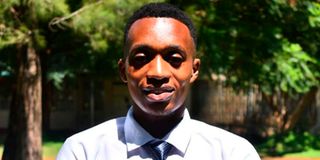
Simon Khaemba.
“We missed one of our units because we were told to pay the full amount, yet no one told us exactly how much we were supposed to pay. The government keeps saying we only need to pay a portion, but in reality, we’re still being forced to cover the entire fee ourselves.
“It feels like we’re being pushed into a corner with no support. We’re not asking for handouts just transparency and fairness. Right now, it feels like the system is failing us, and we are the ones paying the price,” Simon protests.
According to Helb Chief Executive Officer Geoffrey Monari, by April 17, at least 4,621 university students had submitted appeals challenging their government funding allocations under the new financing system.
“We have received the appeals but we have not processed them because we are waiting for the supplementary budget so that we know how we will allocate. Right now there is no money so there is nothing to allocate,” Mr Monari told the Nation.
Allan Ochieng of Masinde Muliro University says the delay in the disbursement of Helb funds has been a nightmare for many students. As a student leader, he has witnessed first-hand the desperation of his fellow students.
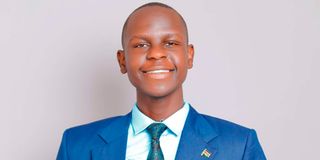
Allan Ochieng'
“Many students have come to me crying, some on the verge of deferring their studies, because they simply cannot afford to continue. I have a close friend who had to drop out, not because of poor grades, but because they lacked upkeep funds and couldn’t find a way to survive on campus,” Allan explains.
Despite President William Ruto’s assurance that Helb funds would be disbursed on time, the students say they never got the money for last semester and they are struggling to survive.
“I do not support the new funding model. The fees are too high. Students are suffering. Helb is delaying. What are we supposed to do?” Elvis Otieno, a Technical University of Mombasa student leader asks.
Cheaper diploma courses
“Many parents are already overwhelmed by the cost of living. Now, they’re being asked to shoulder even more. Some students are on the verge of dropping out. Others are skipping meals just to save money for fees. Education is supposed to be a right, not a privilege for the few. The burden is unbearable. The government needs to listen. We need urgent review and action before it’s too late,” Elvis says.
Sydney Mwangi, a student at Multimedia University, says the new funding model is inconsiderate to students from working-class families. He adds that some of her classmates dropped out and opted for cheaper diploma courses.

Sydney Mwangi.
“I’m the firstborn and was placed in Band 5 because my parents work, but I almost missed my exams due to fees arrears. I had to pay Sh125,000, which was a huge burden, we didn’t even know how much we were supposed to pay. Some classmates had to drop out to do diploma courses because its way cheaper,” Sydney says.
Abich Carlos, a student leader at Mount Kenya University, says the funding model has shattered students’ dreams. He argues that the government’s criteria for determining levels of financial need is unreliable, leaving many bright students unable to pursue competitive courses like medicine due to high fees.
Despite being listed on the Kenya Universities and Colleges Central Placement Service (KUCCPS) portal, institutions like Mount Kenya University receive little to no direct funding under the new model.
Data from KUCCPS shows that over 100,000 candidates who sat for the 2024 KCSE exams and attained a C+ grade or higher have yet to apply for university placement.
Mr Monari told the Nation some universities have received partial funding to support a few students.
“They have disbursed some money to a number of universities, but I must emphasise, it is not the full amount, and it is not across the board. There are institutions that are yet to receive anything. Even for those that have received, it only covers a portion of the students,” he said.
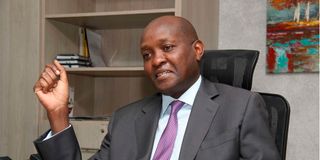
Geoffrey Monari, the Universities Fund chief executive officer.
Mr Monari explained that the Ministry of Education had directed universities to allow students who have paid a portion of the fees expected to be covered by parents or guardians to sit their exams regardless of whether the government had paid its share.
“The government component should not be a reason to lock anyone out. That is the guidance we are working with,” he said.
He added that while capitation for some first-year students had been received, it was neither sufficient nor timely.
The chairperson of the Public Universities Vice-Chancellors Committee, Prof Daniel Mugendi, dismissed claims that students were being barred from sitting end-of-semester examinations over fees arrears. He said that the confusion stemmed from an earlier High Court ruling that declared the new funding model illegal.
“Even as universities, we couldn’t tell them what fee to pay. After the stay order came, we instructed universities to ask students to pay fees according to the bands in which they had been placed,” Prof Mugendi said. “But because this came just about two weeks before exams began, many students were not prepared financially.”
Fees arrears
He emphasised that universities were urged not to stop students from sitting exams due to fees arrears, particularly those placed in higher bands (three to five), which require significantly higher household contributions.
“They were asked to pay, but they should not have been turned away from exams. They were to be informed that come September, when the new academic year begins, they would not be allowed to register if they had not settled the fees,” Prof Mugendi said.
He acknowledged that while the government has continued to release Helb funds and scholarships, there have been delays. He explained that universities have had to exercise financial prudence, stretching available funds to keep operations going. The situation, he said, has not reached a crisis point, but consistent and timely disbursements would significantly improve the institutions’ stability.
“There were moments when some universities struggled to pay salaries on time. But we’ve managed. The government has not defaulted, they have continued to honour their obligations, although not always promptly,” Prof Mugendi said.
“Some universities have already cleared pending bills. The trend is improving. For example, by the end of 2023, the collective debt stood at around Sh8 billion. We expect further reduction by the close of the financial year,” he explained.
Prof Mugendi noted that some students who had appealed their categorisation were not successful, primarily due to inaccuracies in the data submitted.
“This is a digital system; it relies on the accuracy of the information entered. Unfortunately, many students did this through cyber cafes, where wrong or generic data was often input. You’d find a boy from a poor home saying his family has assets, while a girl from the same home says she has nothing,” he said.

